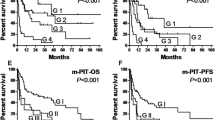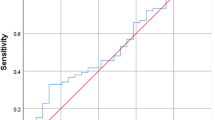Abstract
Purpose
The purpose of the study was to evaluate the prognostic value of low T3 syndrome in peripheral T-cell lymphomas (PTCLs).
Methods
One hundred and seventy-four patients of newly diagnosed PTCLs were enrolled in the study. We performed statistical analysis based on the clinical data collected.
Results
Thirty-Six (20.69%) patients had low T3 syndrome at first admission. Results suggested that the patients with higher score of ECOG PS, International Prognostic Index (IPI) and Prognostic Index for T-cell lymphoma (PIT), bone marrow involvement and lower level of albumin tended to develop low T3 syndrome. The median progression-free survival (PFS) and overall survival (OS) were 10 months and 36 months, respectively, for all patients. Pre-existing low T3 syndrome was in correlation with worse PFS and OS. Patients with low T3 syndrome showed worse PFS (4 months vs 13 months, P = 0.0001) and OS (7 months vs 83 months, P < 0.0001) than patients without low T3 syndrome. IPI and PIT, respectively, combined with low T3 syndrome improved the ability to predict OS and PFS of PTCLs.
Conclusions
The study indicated that low T3 syndrome may be a good candidate for predicting prognosis of peripheral T-cell lymphomas.




Similar content being viewed by others
Data availability
The data that support the findings of this study are available on request from the corresponding author. The data are not publicly available due to privacy or ethical restrictions.
References
Swerdlow SH, Campo E, Pileri SA, Harris NL, Stein H, Siebert R, et al. The 2016 revision of the World Health Organization classification of lymphoid neoplasms [J]. Blood. 2016;127(20):2375–90.
Fiore D, Cappelli LV, Broccoli A, Zinzani PL, Chan WC, Inghirami G. Peripheral T cell lymphomas: from the bench to the clinic [J]. Nat Rev Cancer. 2020;20(6):323–42.
Fliers E, Boelen A. An update on non-thyroidal illness syndrome [J]. J Endocrinol Investig. 2021;44(8):1597–607.
Fliers E, Bianco AC, Langouche L, Boelen A. Thyroid function in critically ill patients [J]. Lancet Diabetes Endocrinol. 2015;3(10):816–25.
Boelen A, Kwakkel J, Fliers E. Beyond low plasma T3: local thyroid hormone metabolism during inflammation and infection [J]. Endocr Rev. 2011;32(5):670–93.
Ren H, Ren J, Wang G, Hong Z, Gu G, Chen J, et al. The non-thyroidal illness syndrome is associated with postoperative surgical site infections in enterocutaneous fistulae [J]. Int J Surg. 2018;51:213–7.
Huang GQ, Zeng YY, Cheng QQ, Cheng HR, Ruan YT, Yuan CX, et al. Low triiodothyronine syndrome is associated with hemorrhagic transformation in patients with acute ischaemic stroke [J]. Aging (Albany NY). 2019;11(16):6385–97.
Chen H, Xu M, Huang Y, He J, Ren W. Low triiodothyronine syndrome is associated with stroke-associated pneumonia [J]. Eur J Clin Invest. 2022;52(11):e13840. https://doi.org/10.1111/eci.13840.
Zhao Y, Wang W, Zhang K, Tang YD. Association between low T3 syndrome and poor prognosis in adult patients with acute myocarditis [J]. Front Endocrinol (Lausanne). 2021;12: 571765.
Su W, Zhao XQ, Wang M, Chen H, Li HW. Low T3 syndrome improves risk prediction of in-hospital cardiovascular death in patients with acute myocardial infarction [J]. J Cardiol. 2018;72(3):215–9.
Sato Y, Yoshihisa A, Kimishima Y, Kiko T, Kanno Y, Yokokawa T, et al. Low T3 syndrome is associated with high mortality in hospitalized patients with heart failure [J]. J Card Fail. 2019;25(3):195–203.
Xiong H, Yan P, Huang Q, Shuai T, Liu J, Zhu L, et al. A prognostic role for non-thyroidal illness syndrome in chronic renal failure: a systematic review and meta-analysis [J]. Int J Surg. 2019;70:44–52.
Ruiz-Nunez B, Tarasse R, Vogelaar EF, Janneke Dijck-Brouwer DA, Muskiet FAJ. Higher prevalence of “Low T3 Syndrome” in patients with chronic fatigue syndrome: a case–control study [J]. Front Endocrinol (Lausanne). 2018;9:97.
Xu J, Wang L. Low T3 syndrome as a predictor of poor prognosis in patients with pyogenic liver abscess [J]. Front Endocrinol (Lausanne). 2019;10:541.
Liu J, Wu X, Lu F, Zhao L, Shi L, Xu F. Low T3 syndrome is a strong predictor of poor outcomes in patients with community-acquired pneumonia [J]. Sci Rep. 2016;6:22271.
Scoscia E, Baglioni S, Eslami A, Iervasi G, Monti S, Todisco T. Low triiodothyronine (T3) state: a predictor of outcome in respiratory failure? Results of a clinical pilot study [J]. Eur J Endocrinol. 2004;151(5):557–60.
Baldelli R, Nicastri E, Petrosillo N, Marchioni L, Gubbiotti A, Sperduti I, et al. Thyroid dysfunction in COVID-19 patients [J]. J Endocrinol Investig. 2021;44(12):2735–9.
Sparano C, Zago E, Morettini A, Nozzoli C, Yannas D, Adornato V, et al. Euthyroid sick syndrome as an early surrogate marker of poor outcome in mild SARS-CoV-2 disease [J]. J Endocrinol Investig. 2022;45(4):837–47.
Llamas M, Garo ML, Giovanella L. Low free-T3 serum levels and prognosis of COVID-19: systematic review and meta-analysis [J]. Clin Chem Lab Med. 2021;59(12):1906–13.
Zou R, Wu C, Zhang S, Wang G, Zhang Q, Yu B, et al. Euthyroid sick syndrome in patients with COVID-19 [J]. Front Endocrinol (Lausanne). 2020;11: 566439.
Sciacchitano S, De Vitis C, D’Ascanio M, Giovagnoli S, De Dominicis C, Laghi A, et al. Gene signature and immune cell profiling by high-dimensional, single-cell analysis in COVID-19 patients, presenting low T3 syndrome and coexistent hematological malignancies [J]. J Transl Med. 2021;19(1):139.
Bunevicius A, Deltuva VP, Tamasauskas S, Smith T, Laws ER, Bunevicius R, et al. Preoperative low tri-iodothyronine concentration is associated with worse health status and shorter five year survival of primary brain tumor patients [J]. Oncotarget. 2017;8(5):8648–56.
Yasar ZA, Kirakli C, Yilmaz U, Ucar ZZ, Talay F. Can non-thyroid illness syndrome predict mortality in lung cancer patients? A prospective cohort study [J]. Horm Cancer. 2014;5(4):240–6.
Gao R, Liang JH, Wang L, Zhu HY, Wu W, Wu JZ, et al. Low T3 syndrome is a strong prognostic predictor in diffuse large B cell lymphoma [J]. Br J Haematol. 2017;177(1):95–105.
Gao R, Chen RZ, Xia Y, Liang JH, Wang L, Zhu HY, et al. Low T3 syndrome as a predictor of poor prognosis in chronic lymphocytic leukemia [J]. Int J Cancer. 2018;143(3):466–77.
Alaggio R, Amador C, Anagnostopoulos I, Attygalle AD, Araujo IBO, Berti E, et al. The 5th edition of the World Health Organization classification of haematolymphoid tumours: lymphoid neoplasms [J]. Leukemia. 2022;36(7):1720–48.
Chen H, Wu Y, Huang G, He W, Lin S, Zhang X, et al. Low tri-iodothyronine syndrome is associated with cognitive impairment in patients with acute ischemic stroke: a prospective cohort study [J]. Am J Geriatr Psychiatry. 2018;26(12):1222–30.
Huang J, Jin L, Ji G, Xing L, Xu C, Xiong X, et al. Implication from thyroid function decreasing during chemotherapy in breast cancer patients: chemosensitization role of triiodothyronine [J]. BMC Cancer. 2013;13:334.
Mendoza A, Hollenberg AN. New insights into thyroid hormone action [J]. Pharmacol Ther. 2017;173:135–45.
Sciacchitano S, Capalbo C, Napoli C, Anibaldi P, Salvati V, De Vitis C, et al. Nonthyroidal illness syndrome: to treat or not to treat? have we answered the question? A review of metanalyses [J]. Front Endocrinol (Lausanne). 2022;13: 850328.
Acknowledgements
This work was supported by National Natural Science Foundation of China (81800192, 82200887), Science and Technology Department of Jiangsu Province (BK20220716), and China Postdoctoral Science Foundation (2022M711404).
Author information
Authors and Affiliations
Contributions
All authors contributed to the study conception and design. Material preparation, data collection and analysis were mainly performed by WL, RG, WW and JT. The first draft of the manuscript was written by WL and all authors commented on previous versions of the manuscript. All authors read and approved the final manuscript.
Corresponding authors
Ethics declarations
Conflict of interest
The authors declare that they have no conflict of interest.
Ethical standards
The study was approved by the Ethics Committee of the First Affiliated Hospital of Nanjing Medical University. All aspects of this study, including the measurement of serum thyroid hormone levels such as serum free T3 (FT3), free T4 (FT4) and TSH, and other clinical and laboratorial checkups, were performed in accordance with the principles of the Declaration of Helsinki (64th, 2013).
Informed consent
All persons gave their informed consent prior to their inclusion in the study.
Additional information
Publisher's Note
Springer Nature remains neutral with regard to jurisdictional claims in published maps and institutional affiliations.
Rights and permissions
Springer Nature or its licensor (e.g. a society or other partner) holds exclusive rights to this article under a publishing agreement with the author(s) or other rightsholder(s); author self-archiving of the accepted manuscript version of this article is solely governed by the terms of such publishing agreement and applicable law.
About this article
Cite this article
Li, W., Gao, R., Wang, W. et al. Low T3 syndrome as a predictor of poor prognosis in peripheral T-cell lymphomas. Clin Transl Oncol 26, 613–622 (2024). https://doi.org/10.1007/s12094-023-03280-9
Received:
Accepted:
Published:
Issue Date:
DOI: https://doi.org/10.1007/s12094-023-03280-9




